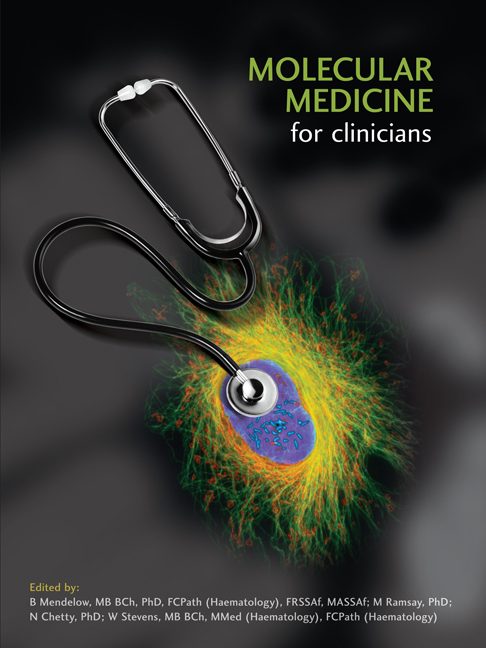Book contents
- Frontmatter
- Contents
- Foreword
- Acknowledgements
- Chapter 1 Introduction
- Keynote Essay 1: Defining Who We Are: DNA in Forensics, Genealogy and Human Origins
- Section 1 Principles Of Cellular And Molecular Biology
- SECTION 2 MOLECULAR PATHOLOGY
- Chapter 8 Genomes and the Environment: An Overview of Molecular Pathology
- Chapter 9 Genetics, Genomics, Health and Disease: General Considerations
- Chapter 10 Chromosome Disorders
- Chapter 11 Mendelian Inheritance
- Chapter 12 Unusual Molecular Processes that Impact on Disease
- Chapter 13 Population Genetics
- Chapter 14 Complex Multifactorial Inheritance
- Chapter 15 Molecular Basis for Phenotypic Variation
- Chapter 16 Medical Genetics
- Keynote Essay 3: Human Cloning: Should We Go There?
- Chapter 17 Neoplasia: General Considerations
- Chapter 18 Oncogenes
- Chapter 19 Mammalian DNA Repair
- Chapter 20 Tumour Suppressor Genes and Inherited Susceptibility to Cancer
- Chapter 21 Carcinoma
- Chapter 22 Leukaemias and Lymphomas
- Chapter 23 Molecular Approaches to the Diagnosis, Prognostication and Monitoring of Cancer
- Keynote Essay 4: Microbes, Molecules, Maladies and Man
- Chapter 24 Molecular Basis of Infectious Diseases: General Considerations
- Chapter 25 Immunology
- Chapter 26 Human Immunodeficiency Virus
- Chapter 27 Tuberculosis
- Chapter 28 Malaria
- Chapter 29 Influenza
- Chapter 30 Oncogenic Viruses
- Chapter 31 Vaccines and Immunisation
- Keynote Essay 5: Drugs and the 21st Century
- SECTION 3 MOLECULAR THERAPEUTICS
- SECTION 4 RESEARCH AND THE CONTINUING EVOLUTION OF MOLECULAR MEDICINE
- Glossary
- Contributors’ Biographies
- Source Material And Recommended Reading
- Permissions And Credits
- Index
Keynote Essay 4: Microbes, Molecules, Maladies and Man
from SECTION 2 - MOLECULAR PATHOLOGY
Published online by Cambridge University Press: 04 June 2019
- Frontmatter
- Contents
- Foreword
- Acknowledgements
- Chapter 1 Introduction
- Keynote Essay 1: Defining Who We Are: DNA in Forensics, Genealogy and Human Origins
- Section 1 Principles Of Cellular And Molecular Biology
- SECTION 2 MOLECULAR PATHOLOGY
- Chapter 8 Genomes and the Environment: An Overview of Molecular Pathology
- Chapter 9 Genetics, Genomics, Health and Disease: General Considerations
- Chapter 10 Chromosome Disorders
- Chapter 11 Mendelian Inheritance
- Chapter 12 Unusual Molecular Processes that Impact on Disease
- Chapter 13 Population Genetics
- Chapter 14 Complex Multifactorial Inheritance
- Chapter 15 Molecular Basis for Phenotypic Variation
- Chapter 16 Medical Genetics
- Keynote Essay 3: Human Cloning: Should We Go There?
- Chapter 17 Neoplasia: General Considerations
- Chapter 18 Oncogenes
- Chapter 19 Mammalian DNA Repair
- Chapter 20 Tumour Suppressor Genes and Inherited Susceptibility to Cancer
- Chapter 21 Carcinoma
- Chapter 22 Leukaemias and Lymphomas
- Chapter 23 Molecular Approaches to the Diagnosis, Prognostication and Monitoring of Cancer
- Keynote Essay 4: Microbes, Molecules, Maladies and Man
- Chapter 24 Molecular Basis of Infectious Diseases: General Considerations
- Chapter 25 Immunology
- Chapter 26 Human Immunodeficiency Virus
- Chapter 27 Tuberculosis
- Chapter 28 Malaria
- Chapter 29 Influenza
- Chapter 30 Oncogenic Viruses
- Chapter 31 Vaccines and Immunisation
- Keynote Essay 5: Drugs and the 21st Century
- SECTION 3 MOLECULAR THERAPEUTICS
- SECTION 4 RESEARCH AND THE CONTINUING EVOLUTION OF MOLECULAR MEDICINE
- Glossary
- Contributors’ Biographies
- Source Material And Recommended Reading
- Permissions And Credits
- Index
Summary
INTRODUCTION
The planet Earth was formed, in a molten state, some 4.5 billion years ago. It cooled off sufficiently 4 billion years ago to allow the formation of the oceans. Cyanobacteria, found in rock fossil records that are approximately 3.6 billion years old, provide the earliest evidence of life in the form of complex unicellular organisms. Molecular phylogeny is the tool that enables us to understand life in all its complexity and recognise relations hips between organisms. In essence, using molecular techniques we are able to deter mine the evolutionary relationships of living creatures. By comparing the difference in sequences of homologous genes encoding ribosomal RNA (16S rRNA genes from prokaryotic cells and 18S rRNA from eukaryotic cells) we can measure the evolutionary distance between species of organisms. Computer analysis of rRNA gene sequences suggests that cellular life has evolved along three major lineages. Two of these, Bacteria and Archaea, are exclusively microbial and consist of prokaryotic cells. The third lineage, Eukarya, not only contains unicellular organisms but also myriads of multicellular organisms. Two important points have emerged from the study of molecular phylogeny: 1) unicellular organisms are the major and most diverse form of life, and 2) eukaryotes are not of recent origin, as previously thought, but as ancient as the Bacteria and Archaea lineages, all of which have emerged from a universal ancestor. Although the human race may live in harmony, and is subject to colonisation with many different prokaryotic (e.g. bacteria) and eukaryotic (e.g. fungi and parasites) organisms, this harmony is shattered from time to time when a relatively restricted number of microbial species enter our body and cause pathology – infection.
Antimicrobials, developed on a mass scale from the 1940s onwards, brought renewed hope that, to quote the UN Surgeon General in his address to Congress in 1969, ‘We can close the book on infectious diseases’. Unfortunately, nothing could have been further from the truth. With the continuous emergence of microbes that display a vast array of antimicrobial resistance mechanisms, the ‘golden era’ of antimicrobials is under serious threat.
- Type
- Chapter
- Information
- Molecular Medicine for Clinicians , pp. 277 - 283Publisher: Wits University PressPrint publication year: 2008



